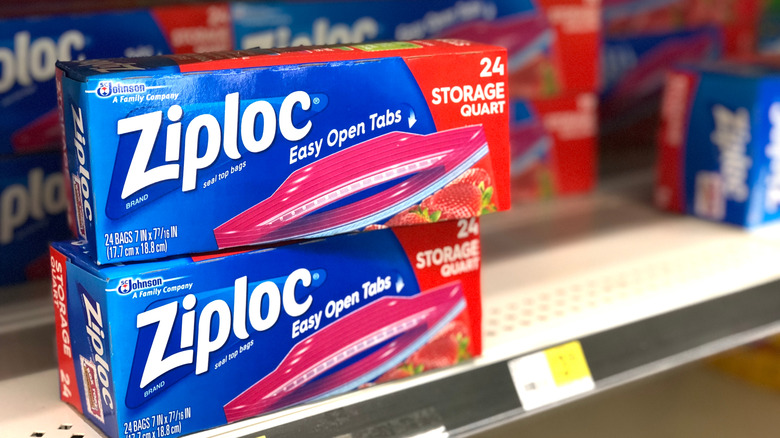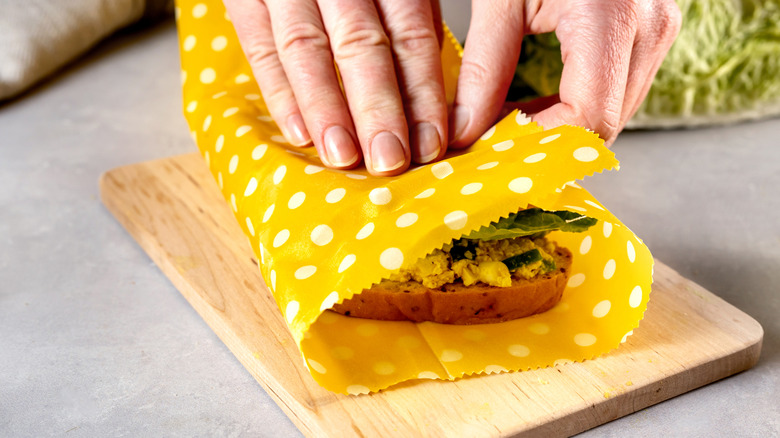Why It's Time To Ditch The Resealable Plastic Baggies (And What You Should Use Instead)
We may receive a commission on purchases made from links.
Forget the knives and the bleach you've got in your kitchen — the most dangerous thing might be your resealable plastic baggies. Okay, fine, maybe not the most dangerous. But the more we learn about plastic's ability to work its way into our body, the more many people are looking for ways to minimize its presence in our lives.
Some are going so far as to take legal action against companies like Ziploc for allegedly making misleading claims about the safety of plastic. For years, Ziploc has said its bags are microwave safe and suitable for freezer use. This was after medical evidence revealed that two types of thermoplastics in Ziploc bags, polyethylene and polypropylene, can be released from the bags when the material breaks down in microwaves or freezers. A class-action complaint is alleging that Ziploc's messaging created a false sense of security that opened up consumers to unknowingly expose themselves to harmful microplastics.
Are plastic storage bags bad for you?
We are still learning a lot about how plastics travel from items like plastic baggies to our bodies, and then what they can do once they're in there. We do know that it's not just Ziploc bags that are exposing us to microplastics. They're everywhere — in places like our clothes, skincare products, and even the food we eat — and they've been found in various parts of our bodies, from the placenta to the blood to the heart. Even just breathing can expose us to microplastics.
The effects are still being studied, and most of our research has been done on animals. But nothing we've learned is very encouraging from a health and safety standpoint. Some studies have pointed to microplastic consumption leading to ill effects like inflammation and hormonal disruptions. Another study showed that people with declining neurological health had a higher rate of microplastics in their brain. There are good reasons to choose glass alternatives over plastic when possible — like reusing glass jars for stackable storage. Plus, there are other replacements.
Alternatives to plastic baggies
Most experts agree there are benefits to ditching plastic kitchen items for safer alternatives when we can. Thankfully, there are several easy-to-use swaps for Ziploc bags and other plastic storage containers. For slimmer storage options similar to traditional plastic bags, try silicone pouches, like Stasher Premium Silicone Reusable Food Storage Bags. Many come in sizes comparable to Ziploc bags, are dishwasher-safe, and, critically, are not made of plastics, so they can be safely used at high or freezing temperatures without breaking down and releasing microplastics. Another simple sandwich bag solution is reusable bags made from plant-based materials, like beeswax, similar to Bee's Wrap Vegan Beeswax Snack Bag. These are thinner than silicone bags and many have fun designs, making them easy to fit in a lunchbox or for storing snacks on the go.
For an extra environmental bonus, you can also try compostable sandwich bags, like Compostic Compostable Sandwich Bags, made from recycled materials like paper. Not only are they free of microplastics, but they will eventually break down and disintegrate (unlike a Ziploc bag, which could live in a landfill for hundreds of years). They do carry a higher price tag than regular resealable plastic bags, but they might be worth it if you're really looking for a swap that's better for both the Earth and for your health.


